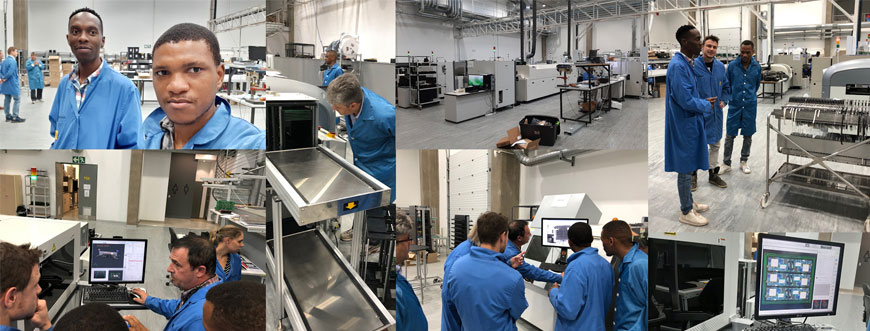Wits team and industry closer to final LVPS prototype
- Wits University
Team visits Jemstech to view progress on first SA-made prototype for Tile Calorimeter of the ATLAS Detector at CERN.
A team of scientists from Wits University’s High-throughput Electronics Laboratory within the Institute for Collider Particle Physics (ICPP) recently visited Jemstech, a turnkey Electronics Manufacturing Services provider, to discuss the production of the second and close-to-final prototype of the Low Voltage Power Supplies (LVPS).
Jemstech has populated the electronics boards for the first prototype made in South Africa of the LVPS for the upgraded Tile Calorimeter of the ATLAS Detector at CERN, the European Laboratory for Particle Physics, where the Large Hadron Collider (LHC), the world’s largest and most powerful particle accelerator, is housed. (*)
The LVPS will power the future on-detector electronics of the Tile Hadronic Calorimeter – one of components of the ATLAS calorimetry system – that is being designed for the Phase-II upgrade of this detector.
South Africa is responsible for the production of over 1000 of these boards, where the printed circuit boards (PCBs) designed at Wits are manufactured by Trax Interconnect in Cape Town and then passed to Jemstech for population.
The Wits team in charge of the South African production is composed of Edward Nkadimeng, Nkhosiphendule Njara, Thabo Lepota, Ryan McKenzie, Charles Sandrock, Roger van Rensburg and Bruce Mellado. They are part of the ICPP in the Wits School of Physics.

“We discussed quality control issues, details of the bill of materials and other components as well as the implementation of Artificial Intelligence in the process of quality control assessment,” says Professor Bruce Mellado, Director of the ICPP.
The Wits Institute of Collider Particle Physics (http://hep.wits.ac.za) leverages activities to deliver world-class training to South African post-graduate students and to provide technology transfer to the country in areas that are badly needed. It develops projects in Big Data and Artificial Intelligence with the CERN, and with industry.
(*) Calorimeters measure the energy a particle loses as it passes through the detector. It is usually designed to stop entire or “absorb” most of the particles coming from a collision, forcing them to deposit all of their energy within the detector.
